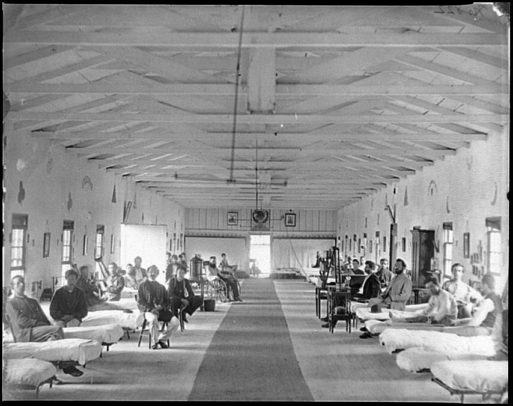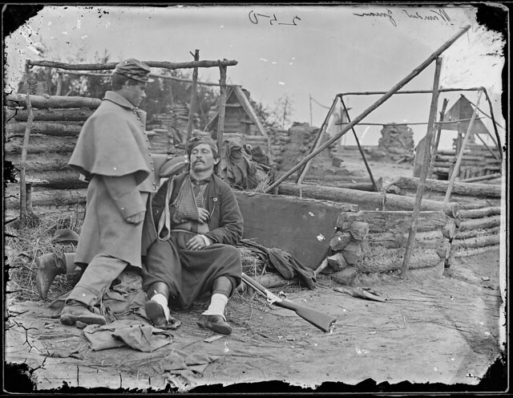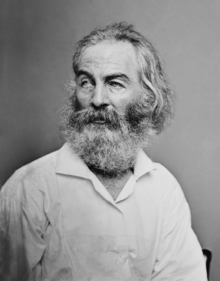
Patients in Ward K of Armory Square Hospital in Washington, DC in 1865
In 1862 Walt Whitman found his younger brother George’s name listed among the wounded in the New York Tribune’s account of the 51st New York Regiment’s casualties at Fredericksburg. Whitman hastened south to the battlefield and — after an arduous journey — found his younger sibling.
George had been wounded, but not badly. The poet, however, helped medics tend to the more grievously injured while sharing George’s tent on the front line for nine days, He stayed on in Washington as a voluntary nurse two years during and immediately after the war. The experience was captured in Whitman’s collection of war poems, written in a free-verse form as daring at that time as his depiction of the battlefield.
According to most Civil War accounts, the ratio of male nurses to female nurses was five to one. Whitman’s poem “The Wound-Dresser” serves as one veteran nurse’s monologue about bitter battlefield realities. Early on, the speaker begins to clarify his purpose.
I dwell not on soldiers’ perils or soldiers’ joys …
Instead, he fills the reader in on the grim medical details of the national conflict.
Bearing the bandages, water and sponge,
Straight and swift to my wounded I go,
Where they lie on the ground after the battle brought in,
Where their priceless blood reddens the grass, the ground,
Or to the rows of the hospital tent, or under the roof’d hospital,
To the long rows of cots up and down each side I return,
To each and all one after another I draw near, not one do I miss,
An attendant follows holding a tray, he carries a refuse pail,
Soon to be fill’d with clotted rags and blood, emptied, and fill’d again.

Credit: Matthew Brady, The U.S. National Archives
The speaker/nurse says he is firm with each patient, yet admits “the pangs are sharp yet unavoidable.” One wonders if he is referring not only to the pain suffered by the wounded, but the discomfort felt by someone who is trying to save the unsavable as well.
The crush’d head I dress, (poor crazed hand tear not the bandage away,)
The neck of the cavalry-man with the bullet through and through I examine,
Hard the breathing rattles, quite glazed already the eye, yet life struggles hard,
(Come sweet death! be persuaded O beautiful death!
In mercy come quickly.)
The speaker dresses these wounds and more (an arm stump, an amputated hand, the list goes on and on) amidst the shadow of death and the putrid smell of gangrene. He says he does so struggling to ward off emotion.
…with impassive hand, (yet deep in my breast a fire, a burning flame.)

Whitman as photographed
by Mathew Brady
Credit: wiki.commons
The speaker leaves the reader with his grim recollection of serving. When he cannot remedy, he offers compassionate companionship to those grievously wounded on the battlefield in their final hours.
Thus in silence in dreams’ projections,
Returning, resuming, I thread my way through the hospitals,
The hurt and wounded I pacify with soothing hand,
I sit by the restless all the dark night, some are so young,
Some suffer so much, I recall the experience sweet and sad,
(Many a soldier’s loving arms about this neck have cross’d and rested,
Many a soldier’s kiss dwells on these bearded lips.)
Threats of war bounce back and forth like ping pong balls in the political rhetoric of our times, perhaps all times. Memorial Day (originally known as Decoration Day) started after the Civil War of which Whitman writes, to honor the Union and Confederate dead. It takes a humanist, a poet, a poem like Walt Whitman’s “The Wound-Dresser” to strip the facade of romanticized glory as soldier faces soldier in battle, down to its bare bone consequences: injury and death. As we rightfully honor those who have died serving in the American armed forces this Memorial Day, let us not forget how truly devastating and painful war is.
A full version of the poem “The Wound-Dresser” may be found here.

 “The Wound-Dresser” by Walt Whitman
“The Wound-Dresser” by Walt Whitman


 First the Wealth Gap, Now the U.S. Has a Growing Health Gap
First the Wealth Gap, Now the U.S. Has a Growing Health Gap
 How to Comfort A Dying Loved One
How to Comfort A Dying Loved One
 Our Annual Seven Holiday Gifts for Someone Who Is Grieving, 2024 Edition
Our Annual Seven Holiday Gifts for Someone Who Is Grieving, 2024 Edition














